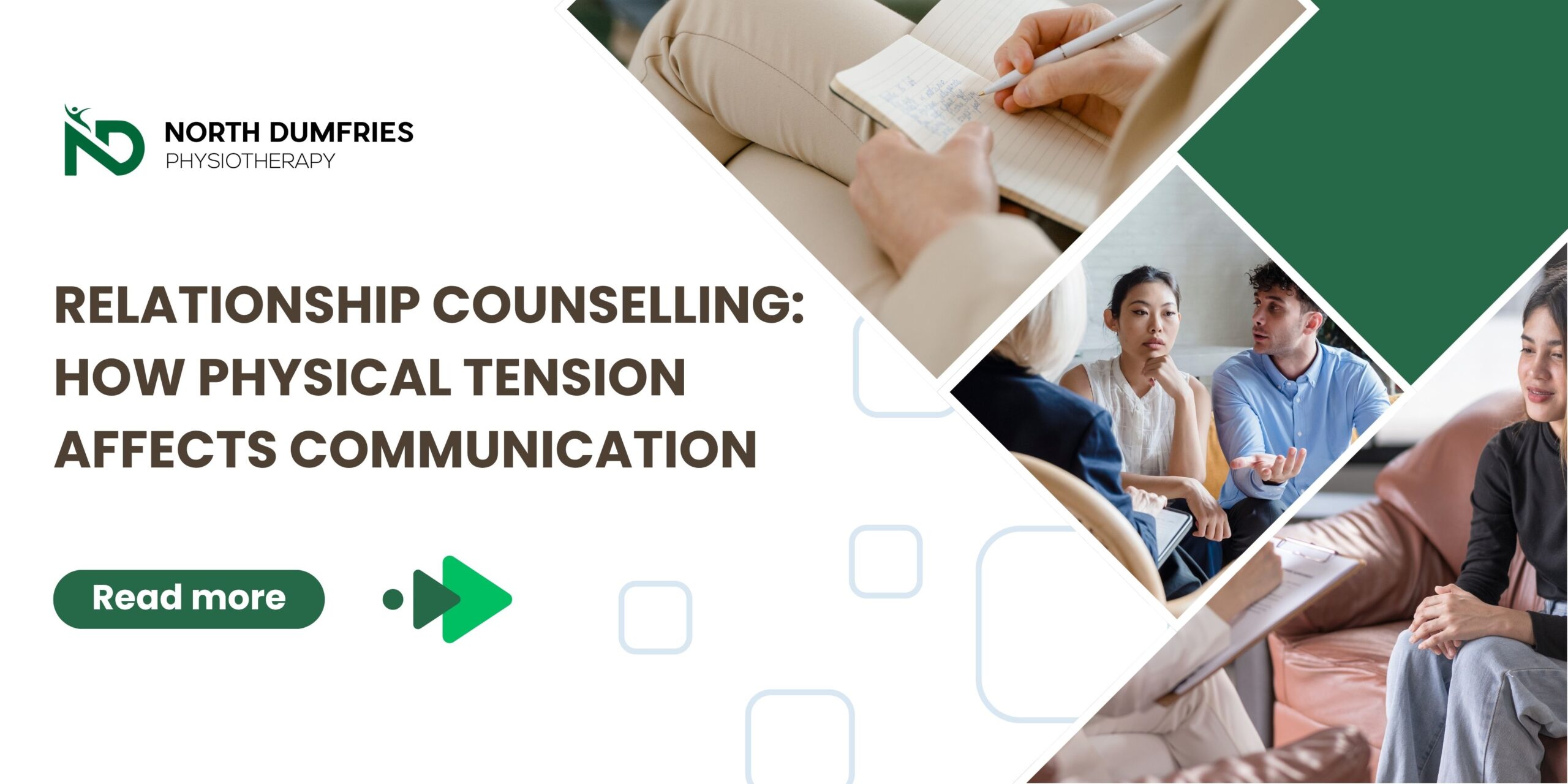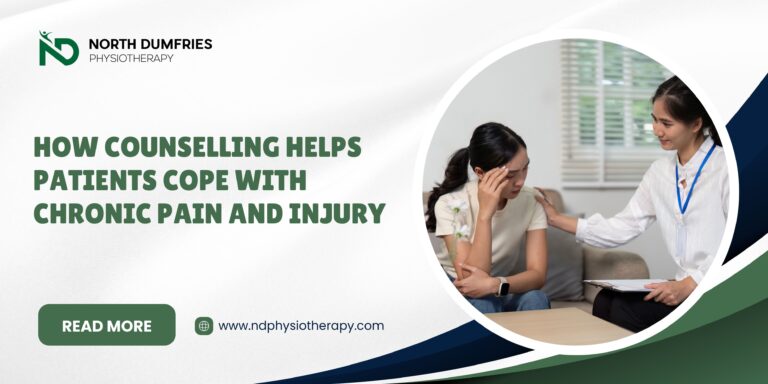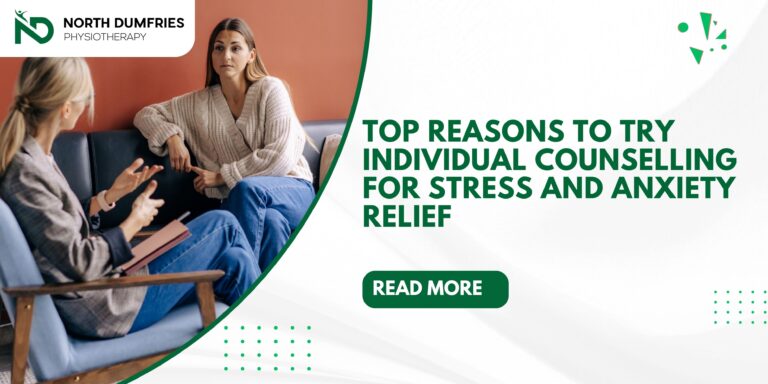Have you ever wondered why simple talks with your partner sometimes turn into arguments? It is often not about what you say, but how you feel when you say it. Tight shoulders, a clenched jaw, or shallow breathing can make your words sound colder than you intend. Over time, that physical tension builds walls between partners who actually care deeply for each other. It is a quiet pattern that many couples never notice until communication starts breaking down. Through counselling for couples communication, partners can learn how body tension shapes emotions and how small physical changes can bring calm back into conversations.
When Stress Turns into Physical Tension
Stress always finds a home in your body. Think about the last time you felt overwhelmed. Your shoulders probably rose up, your jaw tightened, and your breath turned shallow without you even realizing it. That is your body’s built-in feature, the “fight or flight” system, doing its job.
Now imagine two people under that same pressure trying to talk things out. Research shows that when both partners feel stressed, they are almost twice as likely to argue that day. It is not that they care less; their bodies are simply stuck in defense mode instead of listening mode. Learning basic relationship stress management can make a huge difference. It helps both partners recognize these signals early and reset before tension builds.
Over time, this physical alertness turns into muscle tightness that comes with sore necks, tense chests, and even headaches. Physiotherapists often notice the same signs in couples who struggle with frequent conflict: tight breathing patterns, jaw clenching, or stiff postures during conversation. These aren’t random aches; they are the body’s quiet way of saying, “I’m under too much pressure.”
How Body Tension Changes the Way You Communicate
1. Tone and Voice
Your tone naturally shifts when muscles around the neck, shoulders, and jaw tighten. The voice may sound firm or irritated even when the words are neutral. A clenched jaw changes the way air passes through the throat, leading to a higher or sharper tone.
In couples, this small change can create big misunderstandings. One person may hear anger when there is only stress. This is why learning to relax the jaw and release the shoulders before a conversation can change how caring or patient you sound.
Small habits, like unclenching the teeth or rolling the shoulders, can soften the voice and reduce defensiveness that can result in conflict resolution in couples. These physical cues often matter more than the words themselves.
2. Breathing Shapes How You Listen
Breathing gets faster and deeper in stress. That quick breathing lowers oxygen flow, which makes it harder to think clearly or stay patient. In calmer states, slow exhaling activates the body’s “rest” system, helping you stay open and understanding.
A study on heart-rate variability found that slow breathing (four seconds in, six seconds out) helps regulate emotions. So, the next time you feel tense mid-conversation, pause together for three slow breaths. It is amazing how something that simple can reset the mood.
3. Body Language Speaks Before Words Do
You can say “I’m fine,” but if your arms are crossed and your jaw is tight, your partner would not believe it. Body language carries emotional truth. Closed posture signals defense; relaxed posture signals trust.
Leaning slightly forward, keeping hands visible, and maintaining gentle eye contact all show safety and openness. These small adjustments turn a cold conversation into a warm on and that is the real heart of counselling for couple’s communication.
Why Pain and Stress Feed Each Other
Chronic pain and emotional stress often create a cycle. When one partner has ongoing pain like back, neck, or headaches, it can drain their patience and energy. Even small misunderstandings can feel consuming.
Research shows that when one partner validates the other’s discomfort (“I can see you are in pain”), emotional tension drops by up to 25%. That is because empathy triggers relaxation, lowering muscle tension for both people.
This is where physiotherapy quietly supports emotional health. The body becomes calmer by easing muscular pain and improving posture. And communication naturally follows when the body relaxes. It is one of those hidden relationship counseling benefits most people don’t expect.
The Body–Brain Connection in Conflict
Your body and brain are teammates. When the body is tense, the brain’s empathy centers go offline. Those same centers light up again when the body relaxes. That is why so many therapists focus on calming the body first.
Heart-rate variability (HRV) studies show that people with more flexible heart rhythms manage emotions better during disagreements. Simply put, a steady breath equals a steady mind.
The next time you catch your heart racing or your shoulders rising mid-discussion, take it as a cue to pause. These physical signs are your built-in reminder that calm starts in the body and not the mind.
A 5-Minute Reset Before Tough Conversations
Here is a short, practical routine you can do before diving into emotional topics. It helps couples shift from tension to understanding.
- Breathe Together—Sit facing each other. Inhale for four seconds, exhale for six. Do this three times together.
- Unclench—Drop your tongue from the roof of your mouth and let your jaw rest.
- Gentle Touch – Hold hands or share a short hug. A 20-second hug lowers cortisol levels, which is the stress hormone in the body.
- Posture Check – Sit tall with open shoulders. Let your body say, “I’m here, not hiding.”
- Speak Slowly – Let your breath set the rhythm. Pause before answering instead of rushing to reply.
These small steps build emotional safety. It is not about avoiding conflict, it is about staying connected while you work through it. Simple habits like this can ease physical tension in relationships, helping both partners feel calmer and more understood even during difficult conversations.
How Professional Counselling Helps Couples Reconnect
Relationship counselling isn’t just about fixing fights. It helps couples understand what is really happening when they argue or grow distant. A counsellor listens and guides both partners to see how stress and body tension can change the way they talk and react. You learn how to speak calmly, listen better, and notice early signs of frustration before things get worse. Counselling also teaches ways to relax the body and mind during tough talks. Over time, these small changes help couples feel closer, build trust again, and make daily communication a lot easier and kinder.
Frequently Asked Questions
1. Can physical tension really affect how couples communicate?
Yes, tight muscles and shallow breathing can change your tone and patience. This can make normal conversations feel tense or defensive.
2. How can we reduce body tension before a difficult talk?
Take a few slow breaths, relax your shoulders, and loosen your jaw; these small actions calm your body and mind.
3. Is relationship counselling only for serious problems?
No, couple counselling helps with everyday communication, stress, and understanding. It is for any couple who wants a stronger connection.
4. Can stress in one partner affect the other person too?
Absolutely. Stress often spreads between partners, so learning to manage it together helps both feel calmer and more supported.
Conclusion
Good communication starts with a calm body. When you relax your muscles, slow your breath, and soften your tone, your words carry warmth instead of tension. That is the secret to strong connection: less defence, more understanding.
Many counsellors say that successful conflict resolution in couples begins with physical awareness. When your body feels calm, your mind stays open and patient. If stress, posture, or chronic pain are affecting how you relate, it might be time to focus on your physical well-being too. The team at ND Physiotherapy offers gentle, effective care to help you move freely, breathe deeply, and connect more kindly. Because when your body feels safe, your relationship does too.








